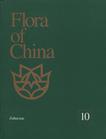中国植物志 第10卷
出版时间:2010-4 出版社:科学出版社 作者:吴征镒,洪德元 著 页数:642
前言
Volume 10 of the Flora of China is the 18th of the 24 text volumes in the series. It includesone family, 29 tribes, 167 genera, and 1,673 species, among which one genus and 690 species(41%) are endemic to China, and three or four tribes, 32 or 33 genera, and 131-134 species (8%)are introduced to China. Volume 10 is formatted in the same manner as the first 17 volumes of the series: vol. 17(1994), vol. 16 (1995), vol. 15 (1996), vol. 18 (1998), vol. 4 (1999), vol. 24 (2000), vol. 8 (2001),vol. 6 (2001), vol. 9 (2003), vol. 5 (2003), vol. 14 (2005), vol. 22 (2006), vol. 13 (2007), vol. 12(2007), vol. 11 (2008), vol. 7 (2008), and vol. 25 (2009). The following 16 accompanyingvolumes of the Flora of China Illustrations have been published to date: vol. 17 (1998), vol. 16(1999), vol. 15 (2000), vol. 18 (2000), vol. 4 (2001), vol. 24 (2002), vol. 8 (2003), vol. 6 (2003),vol. 9 (2004), vol. 5 (2004), vol. 14 (2006), vol. 22 (2007), vol. 13 (2008), vol. 12 (2008), vol. 11(2009), and vol. 7 (2009). Bruce Bartholomew co-authored and edited the Hedysareae (Eversmannia), Robinieae, andSesbanieae and edited the Aeschynomeneae, Crotalarieae, Galegeae (Oxytropis), Hedysareae (ex-cept ,4lhagi, Calophaca, and Halimodendron), and Millettieae. Anthony R. Brach co-authoredand edited the Galegeae (Gueldenstaedtia and Tibetia) and edited the Acacieae, Caesalpinieae,Cassieae, Cercideae, Dalbergieae, Desmodieae, Detarieae, Euchresteae, Galegeae (except As-tragalus, Oxytropis, and Phyllolobium), Hedysareae (Alhagi, Calophaca, and Halimodendron),Ingeae, and Mimoseae. Michael G. Gilbert co-authored and edited the Abreae, Amorpheae, andPsoraleeae, edited and partly co-authored the Phaseoleae, and edited the Indigofereae. Lisa J.Pepper and Nicholas J. Turland edited the Fabeae (Lathyrus), Galegeae (Astragalus and Phyl-lolobium), Loteae, Sophoreae, Trifolieae, and Thermopsideae.
内容概要
The Chinese flora, with an estimated 31.500species, is of immense scientific and horticulturalimportance. Noteworthy, too. is Chinese traditionalmedicine, which is based on the remarkableplant resources of the country. Descriptions andidentification keys for this diverse flora, untilnow unavailable in English, have been publishedover the past 17 years in the Flora of China.in conjunction with a separate series, the Floraof China Illustrations. Thirty-four of the total of48 text and illustration volumes have alreadybeen published, thanks to an unprecedented andlong-standing collaboration between Westernand Chinese scientists. This volume entirely comprises the legume family(Fabaceae or Leguminosae), with 1,673 speciesin China, of which 690 are endemic, i.e., foundnowhere else on Earth. The legumes of China aredivided into 29 tribes, starting with the Cercideae.which include the disjunct redbuds (Cercis) andpantropicai Bauhinia, and finishing with theFabeae. which include vetches (Vicia), vetchlings(Lathyras). lentil (Lens culinaris), and pea (Pisumsativum). The largest legume genus in China isAstragalus, with 401 species 0t is also the largestgenus globally, with ca. 3.000 species), followedby Oxytropis (133 species), Indigofera (79 species),in which I. tinctoria and 1. suffruticosa are sourcesof the dye indigo, and Caragana (66 species).
书籍目录
PrefaceIntroductionAcknowledgmentsFabaceae dou keList of Nomenclatural Novelties Published in this Volume of the Flora of ChinaIndex to Chinese NamesIndex to Pinyin NamesIndex to Scientific NamesIndex to Families in the Flora of China and the Flora Reipublicae Popularis SinicaePublished Volumes of the Flora of China and the Flora of China Illustrations
章节摘录
Lianas, woody, with tendrils; whole plant glabrous exceptfor pedicel base and leaf buds. Twigs slightly zigzag, slender;tendrils solitary, slender. Leaves 2-foliolate; stipules caducous;petiole 1-2 cm, slender, glabrous; leaf blade 12-24 x 9-16 mm,membranous, abaxially thinly pubescent on axils of primaryveins, adaxially glabrous, veins 3 per lobe, veins dense, salienton both surfaces, base truncate; lobes obliquely obovate, apexobtuse or rounded. Inflorescence corymbose-racemose, termi-nal on lateral branches, many flowered; peduncle more than 1cm; bracts and bracteoles linear, 1.5-4 mm. Pedicel 1-3 cm,slender. Flower buds ellipsoid, ca. 5 mm. Receptacle cylindric,10-12 mm; calyx lobes 5, reflexed, broadly ovate or lanceolate.Petals white, broadly obovate, ca. 9 ~ 6 mm, abaxially hairynear base, shortly clawed. Fertile stamens 3; filaments ca. 1 cm,glabrous. Staminodes 3-5. Ovary shortly stalked, glabrous;style short; stigma disciform. Legume strap-shaped, com-pressed, ca. 10x 2.5cm, tardily dehiscent, glabrous, suturesslightly thickened. Seeds ellipsoid, compressed, ca. 6 x 4 mm;testa brown. FI. Aug-Dec, ft. Sep-Feb.
媒体关注与评论
"…a landmark series of volumes" ——Economic Botany "…a must for any student of the temperate and subtropical flora of such a vast. species-rich country.." ——Kew Bulletin "…an indispensable tool for identifying Chineseplants..." ——Systematic Botany
图书封面
评论、评分、阅读与下载
用户评论 (总计0条)
推荐图书
- 德国少年儿童百科知识全书-第三.四合辑-平装美惠版
- 德国少年儿童百科知识全书-第五.六合辑-平装美惠版
- 德国少年儿童百科知识全书-第一.二合辑-平装美惠版
- 无敌攻心营销术
- 为心灵引航-爱是人生大战略
- 让平凡人做出不平凡业绩
- 中国当代名家书画大系·王新伦精品选
- 新编国际商务日语实务
- 图说春秋五霸
- 国史研究撷英
- Birds of Southern Africa (平装)
- Witness to Hope: The Biography of Pope John Paul II, 1920 - 2005 (平装)
- 盒饭经济学
- 转机中的经济之道·浦江金融论坛2009
- 房地产企业全程会计核算
- 白领战争
- 最女人
- 养育心理健康宝宝
- 烟花那么凉
- 企业战略管理
- 加油站油气回收环境管理政策法规
- 2010 Collins Map of Scotland (地图)
- Chess (平装)
- "Gavin and Stacey": From Barry to Billericay (平装)
- Fibromyalgia and Muscle Pain: Your Self-Treatment Guide (平装)
